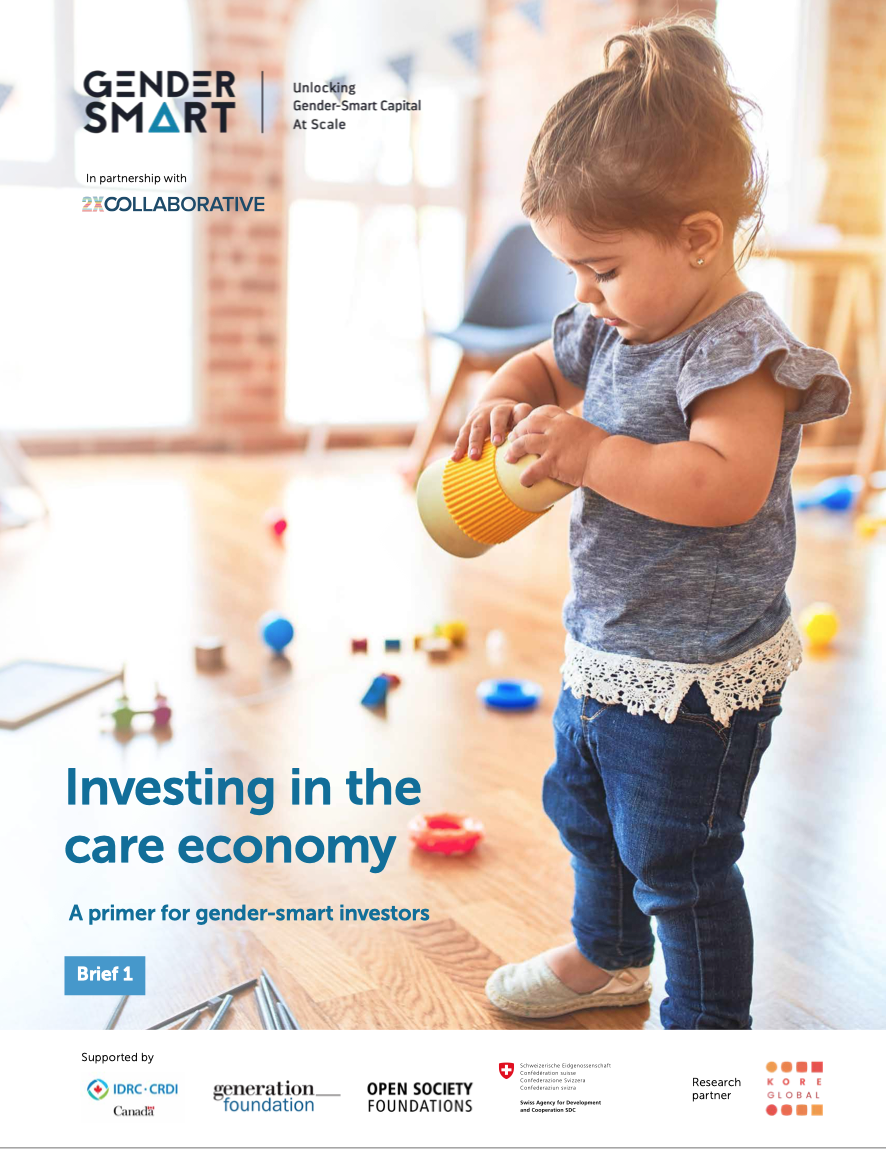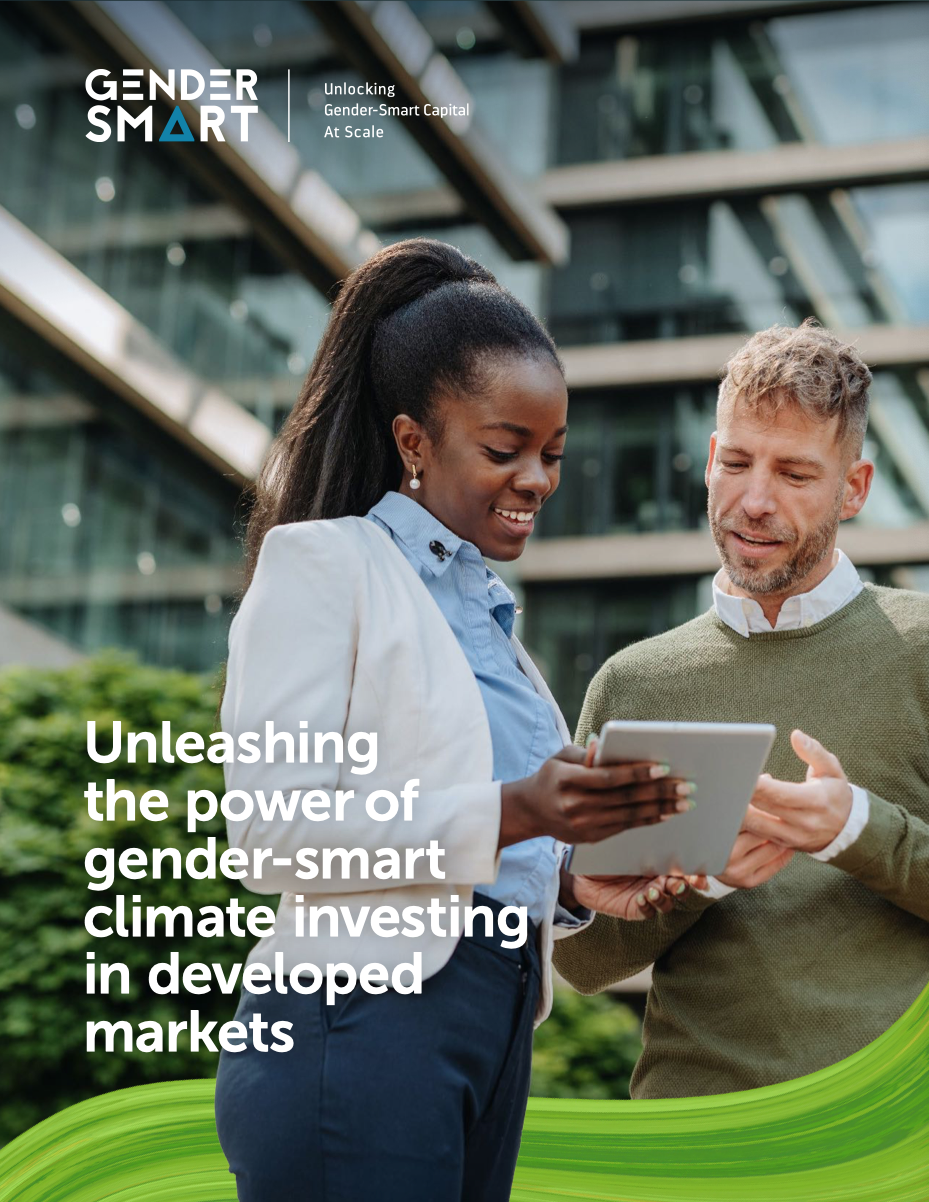Gender Analysis Toolkits
From Equilo - collection of gender analysis frameworks and tools.
Engaging with the care economy: a guide for investors, employers, and corporate actors
In order to amplify the importance of the care economy, provide investors with an understanding, raise awareness and spotlight actionable roadmaps, the GenderSmart & 2X Collaborative Care Economy Working Group 16 commissioned two briefs. This second brief provides practical guidance to investors and employers on how to engage.
Investing in the care economy: a primer for gender-smart investors
In order to amplify the importance of the care economy, provide investors with an understanding, raise awareness and spotlight actionable roadmaps, the GenderSmart & 2X Collaborative Care Economy Working Group 16 commissioned two briefs. This first brief is a primer on what the care economy spans, what different business types are emerging and the breadth of the sector to set up the foundation for investing in the care economy.
Unleashing the power of gender-smart climate investing in developed markets
In the last few years, investors have begun to recognise the vast financial risks that climate change poses. Few investors, however, fully recognise the potential from integrating gender and climate lenses together in investments for long-term climate solutions. The following case studies illustrate the ‘what, why, why now and how’ of gender and climate investing in developed markets, and the opportunities that can arise from integrating both lenses
Development finance institutions and the care economy: opportunities for building more resilient and gender-equitable economies
Jessica Espinoza Trujano & Anne-Marie Lévesque (Journal of Sustainable Finance & Investment)- “Development finance institutions (DFIs) play a major role in mobilizing private sector investments in developing countries. While there has recently been an increasing interest among DFIs in gender-lens investing, these efforts have been somewhat blind to the question of women’s unpaid work and have not yet led to a stronger investment focus on the care economy. Adopting what has been defined by other feminist scholars as a transformative approach to care, this article analyses the potential transformative effects of private sector investments in the care economy by DFIs to help build more resilient and gender-equitable economies following the global COVID-19 pandemic. The authors find there is significant potential for DFIs to approach investments with a more strategic gender- and care-lens and contribute to the recognition, reduction, redistribution, reward, and representation of care work, in line with their objective to promote sustainable socioeconomic development in developing countries.”
Business and Social Outcomes of Gender-Smart Technical Assistance Activities in Small and Medium Enterprises
From Gender-Smart Enterprise Assistance Research Coalition (G-SEARCh)- “This research measured the effectiveness of seven types of TA provided to 21 SMEs across four sectors and three regions. The study confirms that TA activities contribute to positive business and social outcomes for companies and their stakeholders such as employees, customers, distributors, and producers.”
Childcare Solutions for Women Micro and Small Enterprises
By Donor Committee on Enterprise Development. Care work, in all its forms, is a critical social good. It is essential for the provisioning of society and provides the foundation upon which our market economies function. Most care work across the world is unpaid, and its distribution is strongly gendered: more than three-quarters of all unpaid care work globally is carried out by women. A growing body of research has explored the relationship between childcare and women’s economic empowerment in low- and middle-income countries (LMICs). The results suggest that childcare provision can improve women’s labour market outcomes across a number of measures, including employment, income, and transitioning from the informal to the formal sector. Based on these promising links, further research has sought to develop the ‘business case’ for care - focusing largely on two avenues: public investment in childcare provision and formal, employer-supported childcare. A ‘missing middle’ between these two well-documented models, of great relevance for development actors focused on promoting childcare solutions in LMICs, is about meeting the childcare needs of women micro and small enterprises (MSEs), including self-employed workers.
Proposals to Solve Gender Diversity Challenges in Japan’s Startup Ecosystem
This report from FSA Open Policy Lab summarises gender diversity challenges in Japan’s startup ecosystem based on 19 individual interviews, discussion at a workshop, data analysis and literature review conducted by the Open Policy Lab. Three main findings in this report are as follows: Firstly, Japan needs to overcome the persistent gender inequality in the management of listed companies. While numerous measures have been in force, female leaders of the newly listed companies account for only 2%. Secondly, gender diversity in the startup ecosystem is a critical agenda from economic perspectives. Lacking in gender diversity, male-dominant companies may suffer from a variety of losses, including the impact on profitability. Third, all stakeholders in the startup ecosystem should act now to change the status quo. Investment in startups has been on the rise. If current practices remain unchanged, existing distortions would likely be maintained or even strengthened.
Inclusive Distribution: Advancing Gender Equality in the Fast-moving Consumer Goods Sector
From IFC and We-Fi - “Across the world, women play key roles as distributors and retailers of fast-moving consumer goods (FMCG), however, the extent of their participation varies. This learning brief introduces how gender equality can be advanced within the distribution activities of the FMCG sector. It presents an emerging business case, the challenges, and recommendations to address these challenges. The brief is based on IFC projects in Egypt, Indonesia, Nigeria, Philippines, and Sri Lanka; desk research; and interviews with market participants. The target audience comprises FMCG sales and distribution teams; FMCG sustainability teams; e-supply chain actors, including business-to business (B2B) distribution platforms; and investors seeking to accelerate gender equality.”
Towards a Caring Economy
As society emerges from COVID-19 into a recovery economy, questions about the future of care also emerge. What organizational and policy changes are needed to ensure that care work and caregiving is more equal and sustainable? And what research questions on the care economy remain to be investigated? To explore these lines of inquiry, the Institute for Gender and the Economy convened a virtual research roundtable on Care Work in the Recovery Economy in January and February of 2022 with support from Women and Gender Equality Canada and the Social Sciences and Humanities Research Council of Canada. The workshop hosted over 60 scholars and practitioners from around the world who presented their cutting-edge research, identified research agendas, and discussed policy implications for the future of care. This report by Rotman Institute for Gender and the Economy highlights key policy and research insights from the roundtable.
Gender Equality Global Report & Ranking
From Equileap- This report measures gender equality in the global workplace and provides data and insight into the corporate sector. It ranks 4,000 public companies across the world across 19 criteria.
Institutional Asset Owners: Strategies for engaging with asset managers for impact
From The GIIN- Drawing on quantitative and qualitative data from institutional asset owners along with qualitative data from asset managers and intermediaries, this research seeks to detail which strategies and mechanisms asset owners may need in place to align with asset managers to achieve impact across their portfolios. The research brief covers the nature of engagement with asset owners, challenges in pursuing impact alongside asset managers, and strategies to align impact incentives with external asset managers.
Gender and Diversity Finance Position Statement
From British International Investment- This report outlines British International Investments' Gender and Diversity Finance Position for 2022-26 and their commitment to women's economic empowerment.
Donor Agency Engagement in Gender Lens Investing: Approaches and Opportunities
From Donor Committee for Enterprise Development - This paper aims to clarify the synergies between the goals and approaches of Women’s Economic Empowerment and Gender Lens Investing, and to illustrate the possible pathways to close this gap. This document is intended for those working in private sector engagement, with a focus on women’s economic empowerment and gender equality, within donor agencies



